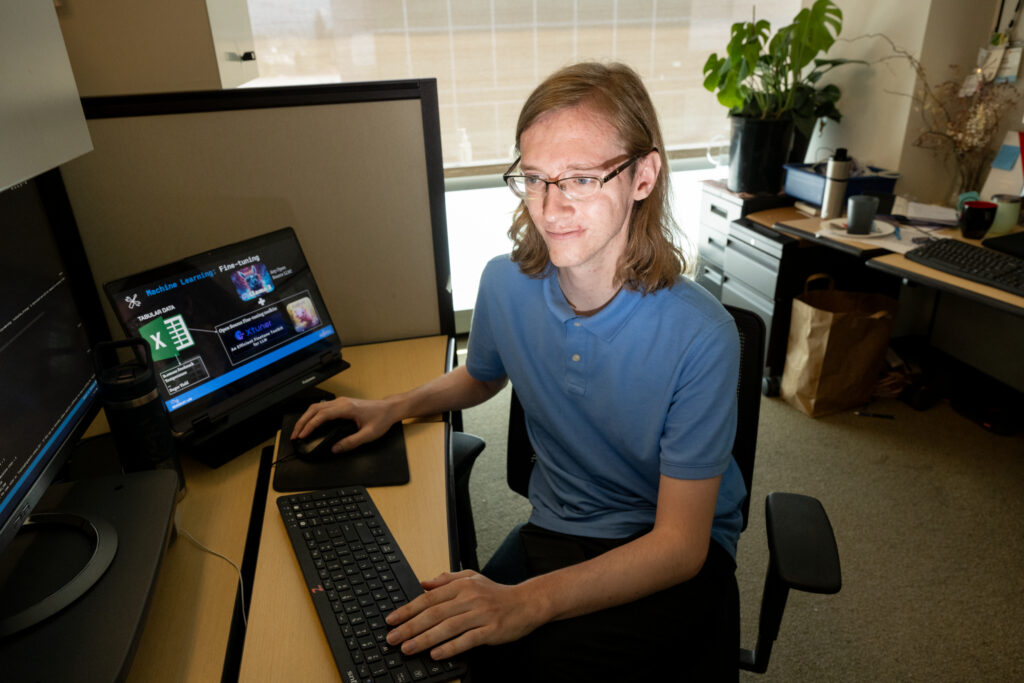
Scottt McCloskey is an undergraduate student studying software engineering at UC Irvine. Scott was an intern at ABPDU in the summer of 2024 as part of the U.S. Department of Energy’s Community College Internships (CCI) program.
Tell us about yourself and how you got started in science.
From a young age, I have been passionate about programming and the latest technologies. In high school, I found my spark and passion for computers when I took an elective course, AP Computer Science, and was awarded an AP Computer Science medallion for my exceptional talent. Growing up as a low-income, non-binary, neurodivergent student has been difficult, but I persisted on a path to continue my computer science education in college. I attended my local community college, Saddleback College, to obtain an associate’s degree in Computer Science and Cyber Defense.
During my time at Saddleback College, I participated in various clubs and extracurricular activities, most notably a year-long research project called SEARCH: SDO Exploration and Research Community for Heliophysics. Before beginning the project, I had no knowledge in Python, heliophysics, or machine learning (ML), but my ambition and interest in computer science set me apart from other students.
In this project, we developed a similarity search model for images of the Sun from the NASA SDO satellite. This project taught me a lot and got me excited about using machine learning models locally on my own computer. I began experimenting with the latest released models for personal projects involving Large Language Models (LLMs), Optical Character Recognition (OCR), and Reinforcement Learning for teaching ML models to learn to play games. Overall from this experience, I became ambitious about pursuing computer science and wanted to continue learning and applying my knowledge in computer science for research.
Thanks to generous scholarships, such as the NSF S-STEM Scholarship and the Society of Military Engineers STEM Scholarship, I have been able to focus more on learning rather than working to sustain my academic expenses. I also participated in a Federal Work Study project funded by the NSF S-STEM scholarship. This project involved developing a software application using PyQT, Python, and the GPIO pins on a Raspberry Pi. The software tool interfaces with student ALU (Arithmetic Logic Unit) boards to automatically test and debug their ALU devices. This project set a new standard for extracurricular projects at Saddleback College and prepared me professionally for my internship at the ABPDU.
Why were you interested in an internship at ABPDU?
The opportunity to intern in a professional environment with scientists and like-minded interns was of great interest for my career development. The resources available at Lawrence Berkeley National Laboratory, such as the NERSC Perlmutter supercomputer, also attracted me.

Specifically, being able to pair the ABPDU’s cutting-edge research and laboratory equipment with the latest machine learning models for a research project was intriguing. Additionally, the location of the ABPDU holds personal significance, as my grandparents grew up in the area and attended UC Berkeley.
What did your internship at ABPDU involve and what did you gain from it?
My internship at the ABPDU involved working on a project I called “SYMPL: Sugar Yield Machine Predictive Learning.” For this project, I worked independently, with guidance from my mentors Dupeng Liu, Brian Taylor, and Yinglei Han, to develop a machine learning model capable of predicting sugar yields from various biomass feedstocks given their composition and pretreatment methods.
To do this, I utilized a dataset from previous ABPDU research experiments and created my own dataset by downloading, pre-processing, and extracting data from over 2,000 scientific papers relevant to biomass feedstock composition, pretreatment methods, and sugar yields. I then implemented various machine learning algorithms such as Linear Regression, Gradient Boosting, and others using Python predictive libraries like XGBoost, Scikit-Learn, and CatBoost.

Additionally, I created a fine-tuned large language model trained on my created scientific paper dataset and ABPDU’s provided dataset. This model served as a chatbot that could make sugar yield predictions based on a given description of a biomass feedstock.
Through my ABPDU internship, I gained vast amounts of knowledge and experience in presentation skills, supercomputer usage, database organization, time management, and the process of creating a scientific paper and poster. I was also given the opportunity to present my project poster at the Berkeley Lab 2024 Intern Symposium and the S-STEM Scholars & Pi conference in Chicago, IL shortly after my internship.

This internship was particularly significant as it was my first time living on my own, which brought its own set of challenges and exciting experiences. I developed many lasting friendships with fellow interns through various Berkeley Lab intern events, socials, and outside activities in San Francisco.
What’s next for you and what are your future career goals?
It’s difficult to top an internship at the ABPDU, but I plan to apply for the Science Undergraduate Laboratory Internships (SULI) program at the national laboratories again this summer. Since becoming an ABPDU alumnus, I have transferred to UC Irvine to pursue a bachelor’s degree in software engineering. I’m continuing my machine learning-involved scientific research there, working with my mentor Nadia Ahmed.

I aim to pursue a Ph.D. in software engineering while remaining involved in machine learning research. I’m also open to the possibility of an industry position in software engineering after completing my bachelor’s degree.
